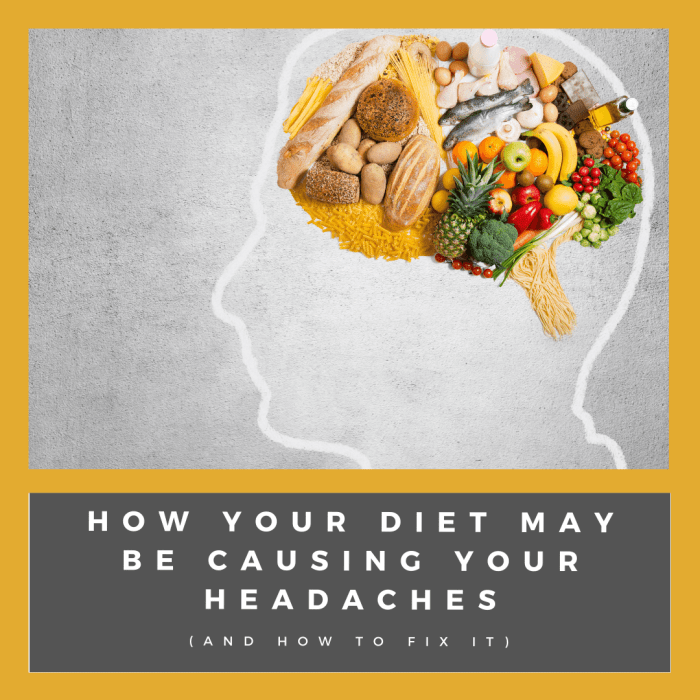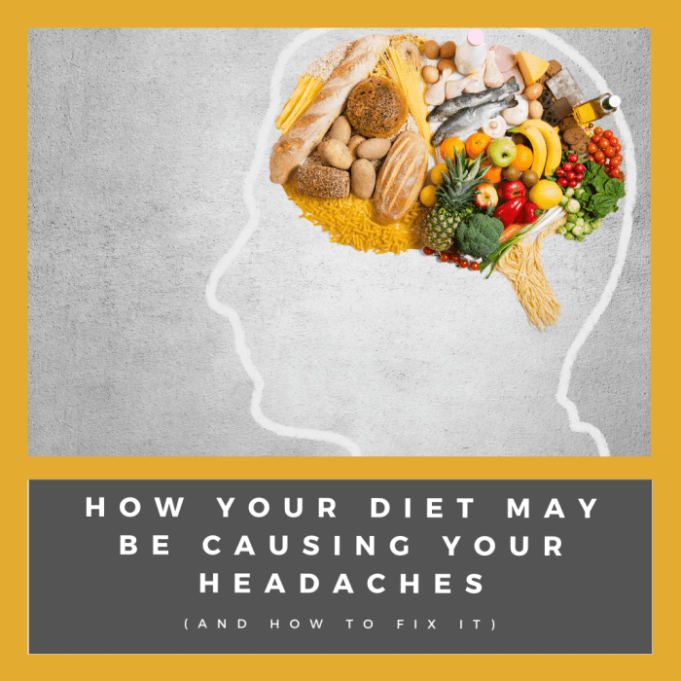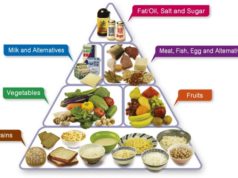Can dieting cause headaches sets the stage for this exploration, examining the intricate relationship between dietary changes and head pain. This journey delves into the physiological mechanisms behind diet-induced headaches, identifying common triggers and types of headaches associated with restrictive eating. We’ll navigate the science of blood sugar fluctuations, electrolyte imbalances, and food sensitivities, uncovering the ways these factors can contribute to headache development.
Understanding the connection between dieting and headaches can empower individuals to make informed choices about their dietary practices, minimizing discomfort and promoting overall well-being. Whether you’re embarking on a new weight-loss journey or simply seeking to understand the causes of your headaches, this exploration provides valuable insights and practical tips for managing diet-related head pain.
Types of Headaches Associated with Dieting: Can Dieting Cause Headaches
Dieting can lead to various types of headaches, often triggered by changes in eating habits, nutrient deficiencies, or dehydration. Understanding the connection between different headache types and dieting can help you identify potential causes and manage your symptoms effectively.
Tension Headaches, Can dieting cause headaches
Tension headaches are the most common type of headache, characterized by a tight band or pressure around the head. These headaches can be caused by stress, muscle tension, and dehydration, all of which can be exacerbated by dieting.
- Dehydration: Restricting fluids during a diet can lead to dehydration, which can trigger tension headaches.
- Nutrient Deficiencies: Diets that lack essential nutrients, such as magnesium and B vitamins, can contribute to muscle tension and headaches.
- Stress: The stress of adhering to a restrictive diet can also trigger tension headaches.
Migraine Headaches
Migraines are more severe headaches that often involve throbbing pain on one side of the head. They can be accompanied by nausea, vomiting, and sensitivity to light and sound. While the exact cause of migraines is unknown, dietary changes can trigger them in some individuals.
- Food Sensitivities: Some people are sensitive to certain foods, such as aged cheeses, processed meats, and chocolate, which can trigger migraines. These foods are often restricted in diets, so their removal or reintroduction can lead to headaches.
- Fasting: Prolonged fasting, a common practice in some diets, can also trigger migraines in some individuals.
- Skipping Meals: Irregular eating patterns and skipping meals can disrupt blood sugar levels, which can trigger migraines.
Other Headache Types
While tension headaches and migraines are the most common types associated with dieting, other types, such as cluster headaches, can also be triggered by dietary changes.
- Cluster Headaches: Cluster headaches are severe, debilitating headaches that occur in clusters, with multiple headaches occurring over a period of weeks or months. The exact cause of cluster headaches is unknown, but some experts believe that dietary changes, such as alcohol consumption, may play a role.
Conclusion

While dieting can sometimes lead to headaches, understanding the underlying causes and implementing strategies for prevention and management can significantly reduce discomfort. By paying attention to dietary triggers, staying hydrated, and maintaining a balanced approach to nutrition, individuals can minimize the risk of diet-induced headaches and enjoy the benefits of healthy eating without experiencing unnecessary pain. Remember, if headaches are persistent or severe, seeking medical advice is essential for proper diagnosis and treatment.
FAQ Overview
Can I prevent diet-induced headaches?
Yes, you can minimize the risk of diet-induced headaches by gradually making dietary changes, staying hydrated, and avoiding known triggers. Consulting a healthcare professional for personalized advice is also recommended.
What are some common headache triggers associated with dieting?
Common triggers include dehydration, caffeine withdrawal, skipping meals, and food sensitivities. It’s essential to be aware of your individual triggers and adjust your diet accordingly.
How long do diet-induced headaches usually last?
The duration of diet-induced headaches can vary depending on the trigger and individual sensitivity. They can range from a few hours to several days. If headaches persist, consult a healthcare professional.
While dieting can sometimes lead to headaches, especially if you’re restricting calories or certain food groups, it’s important to remember that adequate nutrition is crucial for overall health. If you’re looking to boost your intake of collagen, a key component for healthy skin, hair, and joints, consider exploring how to add collagen to your diet.
Collagen-rich foods can be incorporated into your diet plan, potentially reducing the risk of headaches associated with nutritional deficiencies.
While dieting can sometimes lead to headaches due to changes in blood sugar levels or dehydration, it’s important to ensure you’re getting enough nutrients. If you’re concerned about food shortages, you might want to consider stocking up on best foods to buy for long term storage like beans, lentils, and rice, which are packed with nutrients and can be stored for a long time.
Maintaining a balanced diet, even during times of stress or dietary changes, can help prevent headaches and ensure you’re getting the energy you need.
It’s not uncommon to experience headaches when starting a new diet, especially if you’re drastically changing your eating habits. This can be due to factors like dehydration, nutrient deficiencies, or even withdrawal from caffeine or sugar. To better understand the potential causes, it’s helpful to consider the different types of diets out there, like what type of diets are there , and how they might affect your body.
By understanding the potential downsides of different diets, you can make informed choices and minimize the risk of headaches.
























